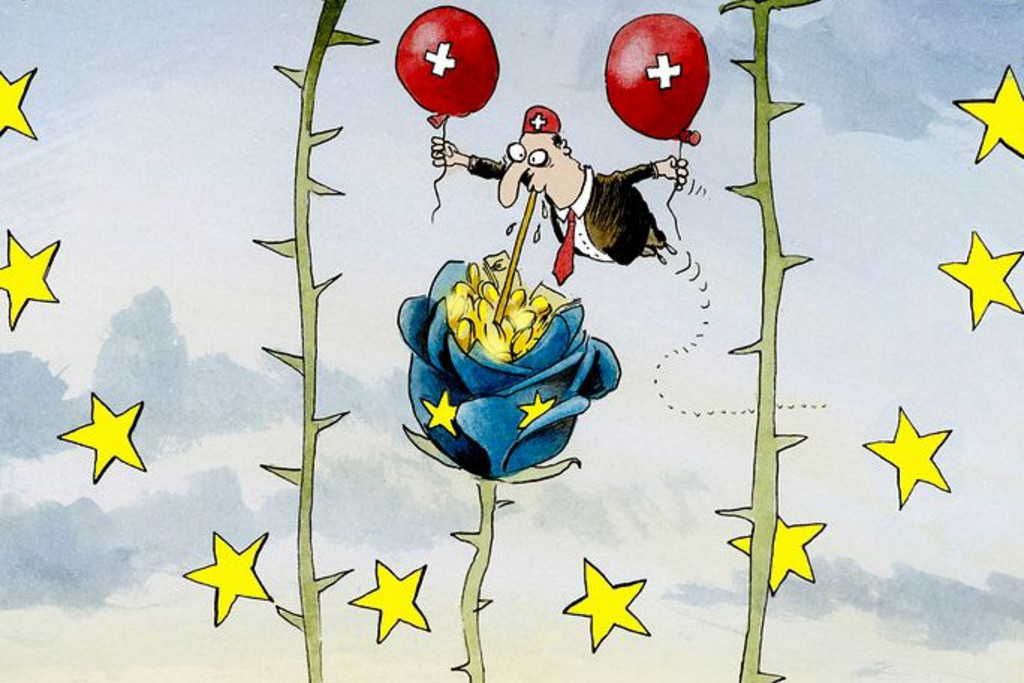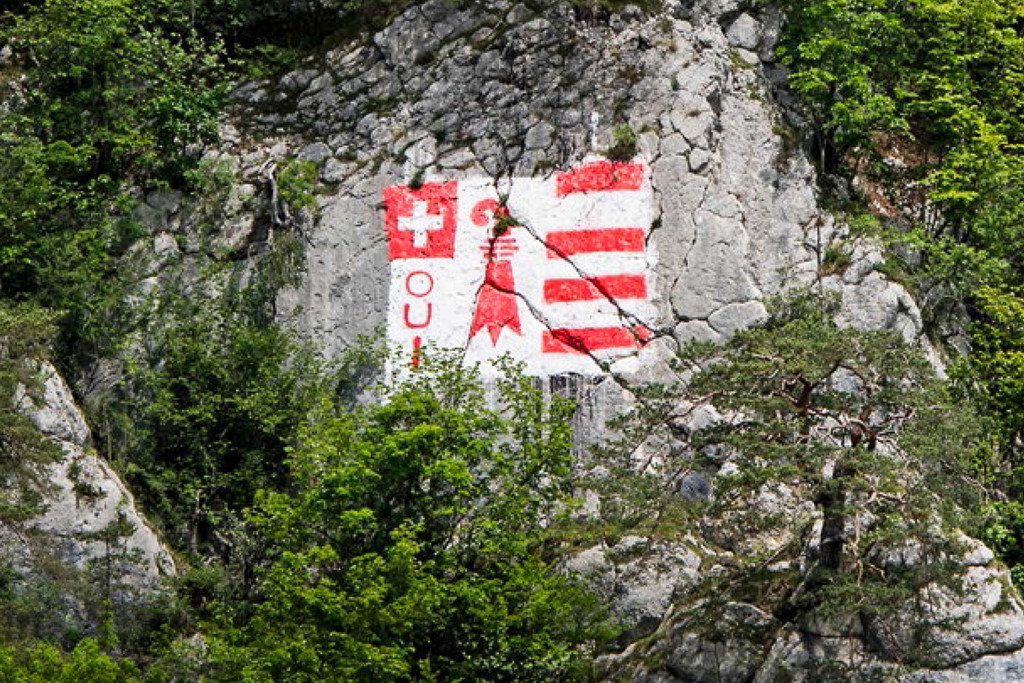Saudi Arabia announced “Operation Decisive Storm” on 25 March 2015. Air attacks on Yemen aimed to bring the Shiite Houthi rebels to their knees and return to power the government under President Abdrabbuh Mansour Hadi which had been driven out. On the same day the first bombs hit the Yemeni capital of Sana’a.
The start of the military intervention in Yemen – a desperately poor country in the southern part of the Arabian Peninsula – had direct implications for the Swiss weapons industry. In consultation with the Federal Council, two days later the State Secretariat for Economic Affairs (SECO) blocked all pending applications for the export of war material to states in the Saudi-led military coalition. In addition to Saudi Arabia, the effective moratorium on exports also included Egypt, Jordan, Qatar, Kuwait, Bahrain and the United Arab Emirates (UAE).
Over a year later, on 20 April 2016, the moratorium was lifted despite the war in Yemen continuing to rage on to the present day. On that same date, the Federal Council dealt with over 50 expired export applications from Swiss companies while the Yemen conflict was going on and finally approved exports worth a total of CHF 185 million after a month of wrangling between the two Free Democrat Federal Councillors Johann Schneider-Ammann and Didier Burkhalter. The great majority of items were spare parts and components for air defence systems sent to Egypt, Bahrain, Saudi Arabia and the UAE. However, the Federal Council also gave the go-ahead for the export of “replacement parts and components for F-5 fighter jets” to Bahrain as well as “replacement parts for M109 tank howitzers” to the UAE. “Misuse to commit violations of international humanitarian law and serious violations of human rights,” wrote the Federal Council, could be “largely” ruled out in the case of such war material.
This decision did not concern the fundamental question of yes or no to weapons exports. This had previously been taken by the Swiss electorate in November 2009 when the popular initiative “for a ban on the export of war material” put forward by a left-wing alliance was overwhelmingly rejected with 68.2 % of voters opposed. It was instead much more about the interpretation of the applicable legal provisions on the export of war material. The case is nevertheless a good example of the complex sphere of conflicting interests in which weapons exports have always found themselves – namely between economic and security policy arguments, on the one hand, and international law and the neutrality and humanitarian principles of Swiss foreign policy, on the other.
The economic importance of weapons exports
These aspects are also covered by the first article of the War Material Act. The act aims “to fulfil Switzerland’s international obligations and the respect of its foreign policy principles by means of controlling the manufacture and transfer of war material and related technology, while at the same time maintaining an industrial capacity in Switzerland that is adapted to the requirements of its national defence”. It should be noted that this act covers only war material in the narrow sense, such as weapons, munitions and defence equipment items “that are designed or modified specifically for use in war or armed combat”, according to SECO. War material is therefore differentiated from “special military goods”, such as training aircraft and reconnaissance drones as well as so-called “dual-use goods”, which cover tooling machines, for example, that can be used for both civil and military purposes.
It is difficult to quantify the economic importance of the Swiss weapons industry precisely as it is not listed separately in statistics. The figures available nevertheless show that it is a comparatively small sector in the Swiss economy. The Swiss ASD division, created with the merger of aeronautics, security and defence within the umbrella organisation Swissmem, indicates a total of around 10,000 employees at 50 companies. It can therefore be very important locally. Mowag in Kreuzlingen, for example, which is renowned for its armoured vehicles such as the Piranha, employs around 650 people and is therefore the largest employer in the small town on Lake Constance. The company belongs to the US group General Dynamics. Other large corporations include Ruag, which is wholly owned by the Swiss Confederation, and Rheinmetall Air Defence, which emerged from Oerlikon-Contraves and is under German ownership.
The proportion of weapons exports in relation to total Swiss exports can nevertheless be calculated. War material worth CHF 447 million was exported in 2015, which makes up just 0.22 % of all exports. Even in 2011, when weapons exports amounted to CHF 873 million, they accounted for just 0.44 % of all exports.
An army requirement
The fact that war material exports in 2015 fell by around 20 % compared with the previous year had nothing to do with the moratorium on exports to the Middle East. SECO confirmed that this was not yet reflected in the figures. In terms of value, the approval of export applications increased by 35 % last year – despite the moratorium – which points to a recent upturn in future weapons exports. The moratorium nevertheless caused significant anxiety in the weapons industry, particularly since it was already suffering as a result of the strength of the Swiss franc and a decline in exports to European countries for years whereas the Middle East is one of its most important growth markets.
Business leaders and a lobby organisation known as the ‘working group for security and defence technology’, to which over 30 conservative MPs belong, put increasing pressure on the Federal Council to relax the policy on exports to Middle Eastern states again. In February, they complained in an open letter to the Federal Council, pointing out that around half of jobs in the weapons industry depend directly upon exports. They warned of job losses and the possible closure of entire plants and reminded it of the “security policy-motivated mandate set out in the War Material Act to maintain an industrial capacity in Switzerland that is adapted to the requirements of its national defence”.
They found Schneider-Ammann, Minister for Economic Affairs, a receptive listener. However, the approval of applications does not just require the authorisation of SECO but also that of the Federal Department of Foreign Affairs (FDFA) led by FDP Federal Councillor Didier Burkhalter. In this particular instance, the FDFA insisted on the ban on exports to states “involved” in the Yemen conflict.
A restrictive approval policy
It referred to the War Material Ordinance. This establishes the basis for a relatively restrictive approval policy in comparison with other European states, such as Germany and France, despite Parliament lowering the threshold again two years ago. The criteria for the approval of export applications reflect the humanitarian principles of Swiss foreign policy but they should also minimise the risk of Switzerland’s reputation being damaged owing to the prohibited deployment of Swiss war material. This does not always succeed. In 2008, Chad violated SECO’s stipulations by using a Pilatus aircraft, which was only intended for training purposes, in combat missions against Sudan. In 2011, it became public that Saudi Arabia had used Mowag armoured personnel carriers to suppress protests by the people in Bahrain.
The ordinance specifically stipulates that when issuing export licences “maintaining peace, international security and regional stability” must be taken into account but also respect for human rights within the destination country as well as adherence to international law. Since 2008 the ordinance has also listed explicit grounds for exclusion. For example, authorisation must be refused if the destination country “commits systematic and serious violations of human rights” – unless there is “a small risk of the exported war material being used to commit serious human rights violations”. Approval may not be granted either if the destination country is involved in an internal or international armed conflict.
Wrangling in the Federal Council
These grounds for exclusion were also invoked by the FDFA in relation to the Yemen conflict. In view of the fact that the war in Yemen is still raging on, it saw no reason to lift the moratorium on exports. Schneider-Ammann’s department, meanwhile, took the view that the ordinance should be interpreted differently – only exports to Yemen itself were explicitly prohibited, especially since any other interpretation would also rule out the export of weapons to nations involved in war, such as the USA or Germany. As the two departments failed to reach agreement, the entire Federal Council eventually had to make a decision. Contrary to Schneider-Ammann’s assumptions, his request for approval of the blocked applications did not immediately receive majority support here either. In addition to Burkhalter, the two SP Federal Council members proved awkward and the CVP Federal Councillor Doris Leuthard was hesitant.
It required the mediation skills of Federal Chancellor Walter Thurnherr for the Federal Council to reach a decision at the third attempt approving most of the blocked applications as mentioned at the beginning. However, it rejected those export applications “where there was suitability for use, and an increased risk of use, in the Yemen conflict”. This concerned small weapons, their ammunition and 25,000 hand grenades. Contrary to Schneider-Ammann’s request, the Federal Council also rejected the export of a Piranha armoured personnel carrier to Qatar. Mowag had wanted to supply this for test purposes and, according to information from the NZZ, was hoping to secure a subsequent order for the export of 400 Piranhas worth billions.
The issue remains on the agenda
While the weapons industry breathed a sigh of relief after the Federal Council’s decision, politicians on the left and organisations such as the Group for Switzerland without an Army were outraged. Motions from the SP and Greens calling for a renewed halt to war material exports to Middle Eastern states are currently pending in Parliament. The demand is also being supported by EVP, CVP and BDP politicians as well as the Green Liberals. This political issue will continue to run and not just because of the critics of weapons exports. The weapons industry also remains unhappy and continues to complain about not having a level playing field with its European competitors. Mowag CEO Oliver Dürr is annoyed that Germany could supply vehicles to Qatar for demonstration purposes whereas the Federal Council denied his company an export licence, as he told the “Neue Zürcher Zeitung” in September.
The humanitarian situation in Yemen has since further deteriorated over recent months and the number of civilian victims is growing. According to the UN, in August at least 10 children were killed in an air attack on a school by the Saudi-led military coalition while 19 people lost their lives in an attack on a hospital. At the beginning of October, over 140 people died in the capital of Sana’a in a suspected Saudi air attack on a funeral and hundreds more were injured. The conflict had claimed over 10,000 lives by the end of August.
Heidi Gmür is parliamentary affairs correspondent for the “Neue Zürcher Zeitung”
The view of Chantal Galladé, SP National Councillor for the canton of Zurich, member of the National Council’s Security Policy Committee:
“Without security there is no quality of life. Security is the result of a society that supports freedom for everyone – and of a functioning constitutional state and good governance. This also includes the capability of the legitimate state authority to ensure the protection of the civilian population with (armed) force within the limits of human rights. Supplying weapons to those who guarantee that they will only be used for the protection of the civilian population and will adhere to human rights is legitimate. Swiss legislation is also based on such considerations. The War Material Ordinance categorically prohibits transactions if the destination country is involved in an internal or international armed conflict or if the destination country violates human rights systematically and seriously. This makes all the more intolerable the Federal Council’s decision of 20 April 2016 – which is erroneous on moral, political and legal grounds – not to stop the ongoing export of war material to the war alliance which has caused a catastrophic humanitarian situation in Yemen and to even authorise new weapons exports to these warring states based on dubious grounds. Blood-stained deals are unworthy of humanitarian Switzerland and are unacceptable.”
The view of Corina Eichenberger, FDP National Councillor for the canton of Aargau, co-chair of the Security and Defence Technology Working Group, chair of the National Council’s Security Policy Committee:
“The Swiss security and defence technology industry is a cornerstone of Swiss security policy. Our nation has a strategic interest in a modern weapons industry to ensure it is not completely reliant upon defence technology imports. In order for the security industry to perform its mandate in the interests of national defence, it is dependent upon both orders from the Swiss army and export opportunities. The Swiss people voted against banning war material exports in 1972, 1997 and most recently in 2009. We are aware that weapons are no ordinary products – they can kill but also protect. The export of arms is subject to rigorous legal provisions in Switzerland. The Federal Council recently evaluated export applications for the Middle East on a country and material-specific basis. The lack of scope for differentiation concerning the internal conflicts criterion in export policy is problematic, which effectively restricts exports to the Middle East to the extent that the industry is greatly disadvantaged compared with its European competitors. Exporting goods of a defensive nature and which cannot be used against the civilian population is right.”














Comments
Comments :
Et voilà! "Si vis pacem, para bellum" - "si tu veux la paix, prépare la guerre". Ce vieil adage romain est à mon avis plus que périme et doit être remplacé par "si tu veux la paix, prépare la paix". Or ce n'est pas en continuant de fabriquer et de vendre des armes, comme pays neutre qui devrait donner l'exemple, que la Suisse avantage la paix et les armes sont faites pour tuer, on le voit aujourd’hui en Ukraine et ailleurs.
Il est en revanche critiquable que les principaux exportateurs d'armes et de systèmes d'armes (US, France, Angleterre, Chine, Russie, Israël, etc) soient aussi les acteurs principaux des conflits de la planète car leur intérêt n'est certainement pas d'obtenir la paix sur terre au risque de voir des millions d'emplois disparaître.
Auf diese Weise zu lieben ist eine Tätigkeit welche keine Belohnung erwartet, weder von Personen noch von Gott,
sie entsteht mit positiven Gedanken, reinem Bewusstsein, der Weisheit und nicht mit Glauben.
Leider gibt es mehr Gläubige als Weise.
Auf diese Weise zu lieben ist eine Tätigkeit welche keine Belohnung erwartet, weder von Personen noch von Gott,
sie entsteht mit positiven Gedanken, reinem Bewusstsein, der Weisheit und nicht mit Glauben.
Leider gibt es mehr Gläubige als Weise.
Je comprend son point de vue, d'autant plus qu'elle a un rapport particulier aux armes en raisons d'un triste évènement survenu dans sa famille.
Malheureusement, il fait l'impasse sur l'hypocrisie générale – y compris celui de son propre parti – concernant les activités économiques de la Suisse sur la scène internationale et ses conséquences directes sur les populations dans les pays en crise. Si " Tout marché entaché de sang est indigne de la Suisse humanitaire et inacceptable. ", nous aimerions bien voir madame Galladé plus engagée contre les véritables activités criminelles contrôlées à partir du territoire suisse qui sont les vraies causes du sang versé : le trading du pétrole et des matières premières – dont le café –, l'industrie agro-chimique, les activités bancaires des places financières genevoises et zurichoises, etc. En effet, ces activités sont les causes réelles des inégalités économiques, des tensions politiques et de la destruction de l'environnement à l'origine des conflits où elle ne supporte pas qu'une arme ou une munition d'origine suisse soit utilisée.
Si elle voulait être vraiment conséquente avec son opinion morale – et je l'en encourage sincèrement – elle devrait commencer par militer pour l'interdiction de la voiture, du stress, de la pollution, de la malbouffe et du travail en Suisse, sources certaines de nombreuses morts en Suisse. Les armes, en comparaison, pèsent assez peu dans cette balance statistique.
Dies würde aber unseren eigenen Entwicklungen u. Produktionen massiv teurer machen!
Eine schwierige Aufgabe die viel Weitsicht, Weisheit und Fingerspitzengefühl bedingt, das leider, zur Zeit, weder im Bundesrat noch in den Parlamenten existiert.
Wenn ich dann noch zu lesen kriege, welch kleiner Prozentsatz diese Exportgueter ausmachen, bin ich mehr als nur perplex, dass diesem Exportzweig eine so hohe Wichtigkeit zugemessen wird.
Ich persoenlich lehne den Waffenexport generell ab.
Ist sie nicht.
Auch in Sachen Waffenexporte. JEDER Export ist eine Stellungsnahme. Unabhängig vom Empfänger / Zweck!
Arbeiter, die sich für eine Arbeitsstelle in der Rüstung entscheiden, müssen genauso jederzeit mit Arbeitseinstellungen oder Entlassungen rechnen wie z.B. Menschen, die im AKW arbeiten.
Jeder Einsatz von Schweizer Waffen und Rüstungsgütern, welcher nicht unter zivilen Polizei- und Sicherheitsdienst fällt, ist durch die Einsatzregeln der Kriegsmaterialverordung verboten. Insbesondere verboten sind der Einsatz in Bürgerkriegen (interner bewaffneter Konflikt), Angriffs- und Verteidigungskriegen (internationaler bewaffneter Konflikt) und menschenverachtenden Diktaturen (Verletzung von Menschenrechten).
Ich stelle deshalb die Frage, welcher Einsatz von Schweizer Rüstungsgütern die Kriegsmaterialverordnung nicht verbietet? Meiner Ansicht nach können Exporte
"Damit die Sicherheitsindustrie ihre Aufgabe zugunsten der Landesverteidigung erbringen kann, ist diese sowohl auf Aufträge der Schweizer Armee wie auch auf Exportmöglichkeiten angewiesen."
gar nicht legal ermöglicht werden, denn Waffen, wie sie die Schweiz für den Verteidigunsfall beschafft, werden im Ausland auch dann benötigt, wenn ihr Einsatz der Schweizer Kriegsmaterialverordnung widerspricht. Die Verordnung verbietet somit indirekt jeden Waffenexport mit Ausnahme von Kleinwaffen und Munition für Polizei- und Ordnungsdienste in Rechtsstaaten. Soweit zumindest meine rechtliche Auslegung - Fall geschlossen?
Um das unwürdige Geschachere um Waffenexporte zu beenden und Menschenleben über Profitgier zu stellen, befürworte ich nachwievor ein striktes Waffenexportverbot.
man muss nicht vor ort sein um zu töten